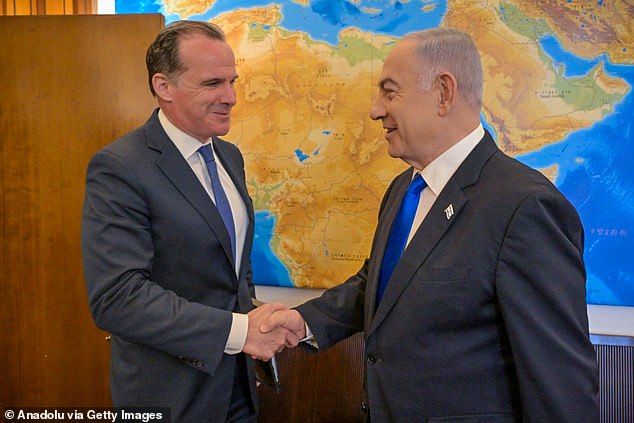The United States, Israel and the United Arab Emirates held a secret meeting to discuss post-war plans for Gaza, a report citing officials says, with proposals believed to include the removal of Hamas authorities and a peacekeeping force on the ground.
Senior US officials attended on the US side, including President Biden’s key Middle East adviser Brett McGurk and State Department counselor Tom Sullivan, Axios reports, citing Israeli sources.
Thursday’s meeting in Abu Dhabi stands in stark contrast to a meeting hosted by China two days earlier, in which Palestinian President Mahmoud Abbas signed an agreement with Hamas officials to establish an “interim government of national reconciliation” in postwar Gaza.
While the outcome of the US meeting with Israeli and UAE officials is unclear, neither Washington nor Tel Aviv is likely to sanction any post-war plan that includes Hamas, which they consider a terrorist organisation.
The two very different meetings underline how distant and perhaps irreconcilable the positions of the two sides are as things stand, as the war continues and casualties continue to mount in the besieged Gaza Strip.
Senior officials were in attendance on the U.S. side, including President Biden’s key Middle East adviser Brett McGurk (pictured earlier this month with Israeli Prime Minister Netanyahu), Axios reports.
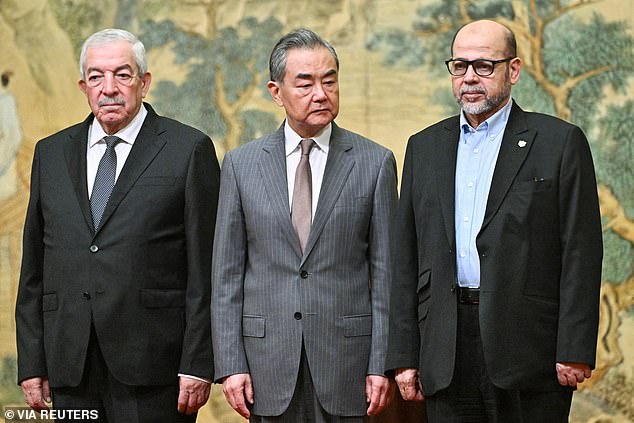
Mahmoud al-Aloul, vice chairman of the Central Committee of the Palestinian political party and organization Fatah, Chinese Foreign Minister Wang Yi and Mussa Abu Marzuk, a senior Hamas member, attend a meeting in Beijing on Tuesday.

A man carries children as people inspect the damage following Israeli shelling in al-Bureij refugee camp in the central Gaza Strip, July 23, 2024.
Prime Minister Benjamin Netanyahu has repeatedly vowed that his forces will continue fighting until Hamas is completely eradicated, even amid international pressure to agree to a ceasefire.
But the secret meeting suggests a growing understanding within the Israeli government that a realistic plan is needed for how Gaza could be governed after the war.
This comes after the United Arab Emirates signalled last week that it is ready to send forces to Gaza as part of a multinational “stabilisation” mission after the war comes to an end.
Comments made by Lana Nusseibeh, a special envoy for the UAE Ministry of Foreign Affairs, the day before the meeting suggested the Gulf state is prepared to be the first nation to deploy troops on the ground after the Israeli offensive if strict conditions are met.
“The UAE could consider being part of stabilization forces alongside Arab and international partners… at the invitation of a reformed Palestinian Authority, or a Palestinian Authority led by an empowered prime minister,” Nusseibeh said.
He added that “the United States should take the lead in this for it to succeed.”
Nusseibeh added that Abu Dhabi held and continued to hold talks the “next day” with all actors involved in the region.
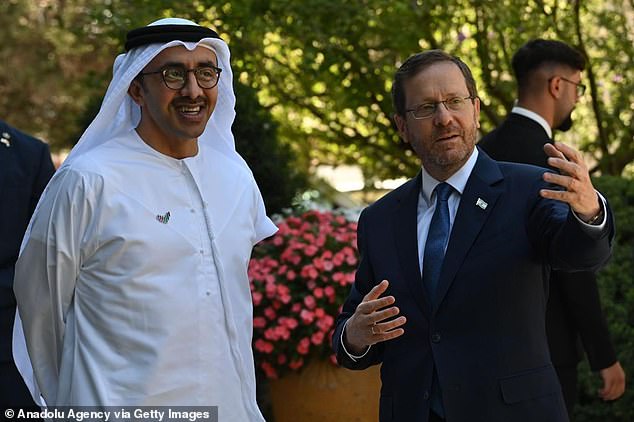
Israeli officials told Axios that Emirati Foreign Minister Abdullah Bin Zayed (pictured in September with Israeli President Isaac Herzog) hosted the meeting.
The development comes as the West, Arab states and China are scrambling to craft a viable post-war plan for Gaza and present themselves as front-runners in brokering a potential deal.
Chinese Foreign Minister Wang Yi received senior Hamas official Musa Abu Marzuk, Fatah envoy Mahmoud al-Aloul and emissaries from 12 other Palestinian groups in Beijing on Tuesday.
He said they had agreed to set up an “interim government of national reconciliation” to govern Gaza after the war, which was backed by China.
‘Today we signed a national unity agreement and we say that the way to complete this journey is national unity.
“We are committed to national unity and we call for it,” Abu Marzuk said after meeting with Wang and the other envoys.
The nine-month-old war was sparked by a Hamas attack in southern Israel in October that killed 1,197 people, most of them civilians, according to Israeli figures.
The militants also captured 251 hostages, 116 of whom are still in Gaza, including 44 who the Israeli military says are dead.
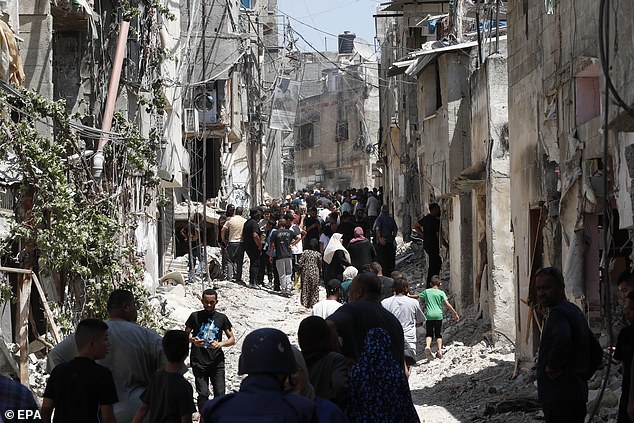
Palestinians inspect the damage caused by an Israeli military operation in the West Bank town of Tulkarem, on July 23, 2024.
Israel’s retaliatory military campaign in Gaza has killed more than 39,000 people, mostly civilians, according to data from the Health Ministry in Hamas-ruled Gaza.
China has sought to play a mediating role in the conflict, which has been made even more complex by the intense rivalry between Hamas, which rules the Gaza Strip, and Fatah, which partially rules the occupied West Bank.
China, Wang said, is willing to “play a constructive role in safeguarding peace and stability in the Middle East.”
He also called for a “comprehensive, lasting and sustainable ceasefire” as well as efforts to promote Palestinian self-rule and full recognition of a Palestinian state at the UN.
But in another sign of discord between the warring parties, and a sign that the deal is unlikely to have any significant immediate impact, Israel quickly condemned it.
Israeli Foreign Minister Israel Katz criticized Abbas for associating with Hamas, writing in X: ‘Hamas and Fatah signed an agreement in China for joint control of Gaza after the war.
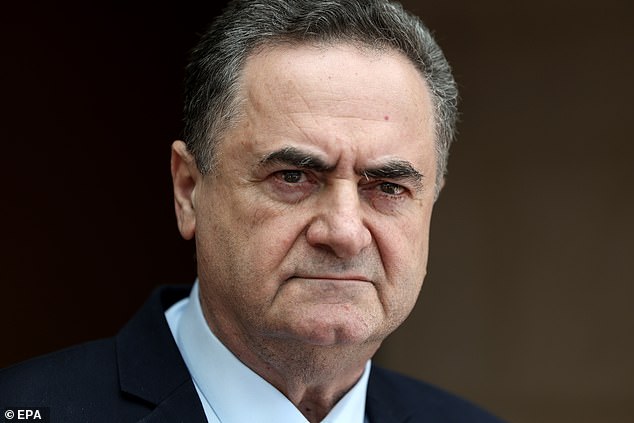
Israeli Foreign Minister Israel Katz criticized the deal, saying in X that Hamas will be “crushed.”
‘Instead of rejecting terrorism, Mahmoud Abbas embraces Hamas’ murderers and rapists, revealing his true face.
“In reality, this will not happen because the Hamas regime will be crushed and Abbas will be watching Gaza from afar. Israel’s security will remain exclusively in Israel’s hands,” he added.
Hamas and Fatah have been bitter rivals since Hamas fighters drove Fatah out of the Gaza Strip after deadly clashes that followed Hamas’s landslide victory in elections in 2006.
Fatah controls the Palestinian Authority, which has partial administrative control in the Israeli-occupied West Bank.
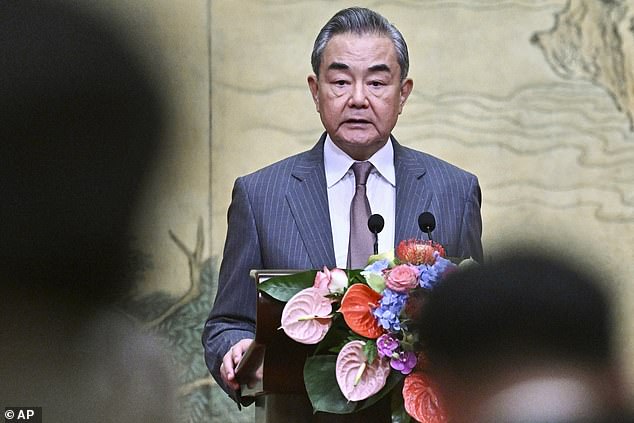
China has positioned itself as a more neutral player in the Israeli-Palestinian conflict than its rival the United States, advocating a two-state solution.
Several attempts at reconciliation have failed but calls have grown since the Hamas attack in October and the nine-month war in Gaza, and violence has also spiked in the West Bank, where Fatah is based.
China hosted Fatah and Hamas in April, but a meeting scheduled for June was postponed.
China has historically been sympathetic to the Palestinian cause and in favor of a two-state solution to the Israeli-Palestinian conflict.
China has positioned itself as a more neutral player in the Israeli-Palestinian conflict than its rival the United States, advocating a two-state solution while maintaining good ties with Israel.


